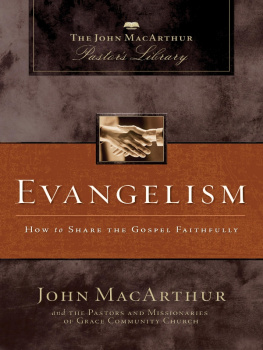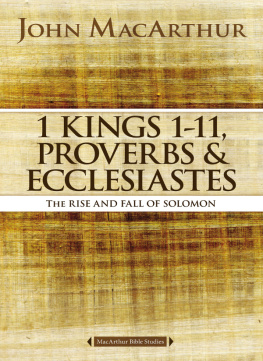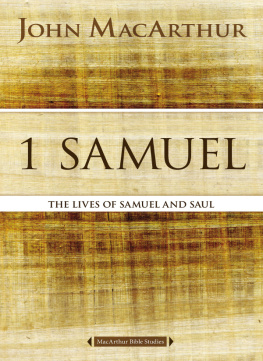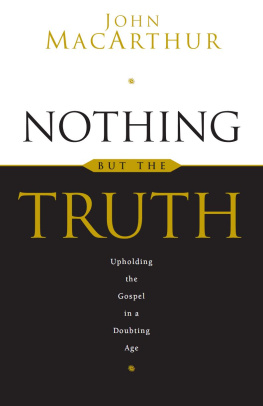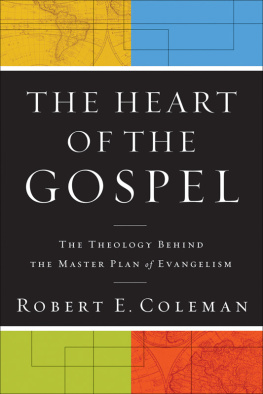
Evangelism

EVANGELISM
HOW to SHARE THE GOSPEL FAITHFULLY
JOHN MACARTHUR
and THE PASTORS AND MISSIONARIES
OF GRACE COMMUNITY CHURCH

2011 by John F. MacArthur.
All rights reserved. No portion of this book may be reproduced, stored in a retrieval system, or transmitted in any form or by any meanselectronic, mechanical, photocopy, recording, scanning, or otherexcept for brief quotations in critical reviews or articles, without the prior written permission of the publisher.
John MacArthur
Unleashing Gods Truth, One Verse at a Time.
Unleashing Gods Truth, One Verse at a Time is a trademark of Grace to You. All rights reserved.
Published in Nashville, Tennessee, by Thomas Nelson. Thomas Nelson is a trademark of Thomas Nelson, Inc.
Published in association with the literary agency of Wolgemuth & Associates, Inc.
Book composition by Upper Case Textual Services, Lawrence, Massachusetts.
Thomas Nelson, Inc., titles may be purchased in bulk for educational, business, fund-raising, or sales promotional use. For information, please e-mail SpecialMarkets@ThomasNelson.com.
Unless otherwise noted, Scripture quotations are taken from THE NEW KING JAMES VERSION. 1982 by Thomas Nelson, Inc. Used by permission. All rights reserved.
Scripture quotations marked NASB are taken from the NEW AMERICAN STANDARD UPDATE. The Lockman Foundation 1995. Used by permission.
Library of Congress Cataloging-in-Publication Data
978-1-4185-4318-1
Printed in the United States of America
1 2 3 4 5 6 [ Printer Code ] 08 07 06 05
Contents
John MacArthur and Jesse Johnson
John MacArthur
Jesse Johnson
Jonathan Rourke
Nathan Busenitz
Rick Holland
John MacArthur
John MacArthur
Rick Holland
Brian Biedebach
Kurt Gebhards
John MacArthur
Jim Stitzinger III
Tom Patton
Kurt Gebhards
Austin Duncan
Rick McLean
Bill Shannon
Michael Mahoney
Mark Tatlock
Kevin Edwards
Clint Archer
Introduction
Rediscovering Biblical
Evangelism
John MacArthur and Jesse Johnson
Evangelism is one beggar telling another beggar where to get bread
D. T. Niles (Sri Lankan church leader and educator, 190870)
Virtually everyone knows the word gospel means good news, and every true Christian understands that the gospel of Jesus Christ is the best news in all of time and eternity.
Of course when someone is in possession of good news, the natural inclination is to want to tell it to everyone. When the news is especially good, our impulse might be to proclaim it from the rooftops. If we think carefully about the gospel messagepondering its meaning, its implications, its simplicity, its freeness, and the eternal blessedness of those who receive itthe urge to tell it to others should be overpowering.
That is precisely why new Christians are often the most passionate evangelists. Without any training or encouragement whatsoever, they can be amazingly effective in bringing others to Christ. They are not obsessed with technique or stymied by fear of rejection. The sheer, grand glory of the gospel fills their hearts and their vision, and they want to talk to everyone about it.
Unfortunately, that passion canand often doesdiminish over time. The young believer soon discovers that not everyone thinks the gospel is such good news. Some respond to it the way they would respond to the stench of death (2 Cor. 2:16). Multitudes despise the message or become offended by it, because it punctures human pride. Many simply love their sin so much they do not want to hear a message of redemption that calls them to repent. Repeated encounters with vehement gospel-rejecters can dampen the enthusiasm of even the most gifted evangelist.
On top of that, the cares of this world and the distractions of daily life vie for our time and attention. Eventually, as the disciple becomes more and more familiar with the gospel, that profound initial sense of wonder and amazement fades somewhat. The gospel is still good news, of course, but we begin to think of it as old news, and that sense of urgency is lost.
It is therefore necessary to remind ourselves constantly how utterly vital the task of evangelism is, and how desperately in need of the gospel this fallen world is. Evangelism is not merely one incidental activity in the life of the church; it is the most urgent duty we as Christians have been given to do. Virtually every other spiritual exercise we do together as members of Christs body we will still be able to do in heavenpraising God, enjoying fellowship with one another, savoring the richness of Gods Word, and celebrating the truth together. But now is the only time we have for proclaiming the gospel to the lost and winning people to Christ. We seriously need to be redeeming the time (Eph. 5:16).
A Christian does not need to be individually called or specially gifted to be a herald of the good news; we are commanded to be witnesses of Christ, commissioned to train others to be disciples. This is an individual obligation, not merely the collective responsibility of the church. No duty is more significant, and none bears more eternally rewarding fruit.
Furthermore, the fields are white for harvest (John 4:35). The current generation is as ripe for the gospel message as any other generation in history. No matter what aspect of contemporary culture you examine, what you will discover are crying spiritual needsand people whose souls are parched and famished for truth. The answer to such a spiritual famine in our land is not the artificial arousal of religious sentiment, not more political activism, not a better public relations campaign, and certainly not for Christians to adapt their message to the prevailing secular worldview.
The central thesis of this book is that the true answer is the unadulterated gospel itselfproclaimed clearly, powerfully, without any gimmick, in all its powerful simplicity. The gospel is the instrument of Gods power for the salvation of sinners (Rom. 1:16). The key to biblical evangelism is not strategy or technique. It is not primarily about style, methodology, or programs and pragmatics. The first and preeminent concern in all our evangelistic efforts must be the gospel.
The apostle Paul emphatically repudiated cleverness, gimmicks, eloquence, philosophical sophistication, and psychological manipulation as tools of gospel ministry: When I came to you [I] did not come with excellence of speech or of wisdom declaring to you the testimony of God. For I determined not to know anything among you except Jesus Christ and Him crucified (1 Cor. 2:12).
What is particularly interesting about Pauls single-minded resolve to preach the undiluted gospel is his immediate admission that he struggled with the same feelings of apprehension and intimidation all of us experience when we contemplate our duty to proclaim it. As he reflected on his early ministry in Corinth, here is how he characterized it: I was with you in weakness, in fear, and in much trembling (1 Cor. 2:3).
And yet, not because of any technique or innate personal proficiency of Pauls, his ministry to them was a powerful demonstration of the Spirit and of power (1 Cor. 2:4). He simply unleashed the gospel in Corinth, and souls were saved. They were only a handful at first, and they came amid fierce opposition (Acts 18:18). But from those small beginnings, a church was founded and the gospel spread still further.
Next page
